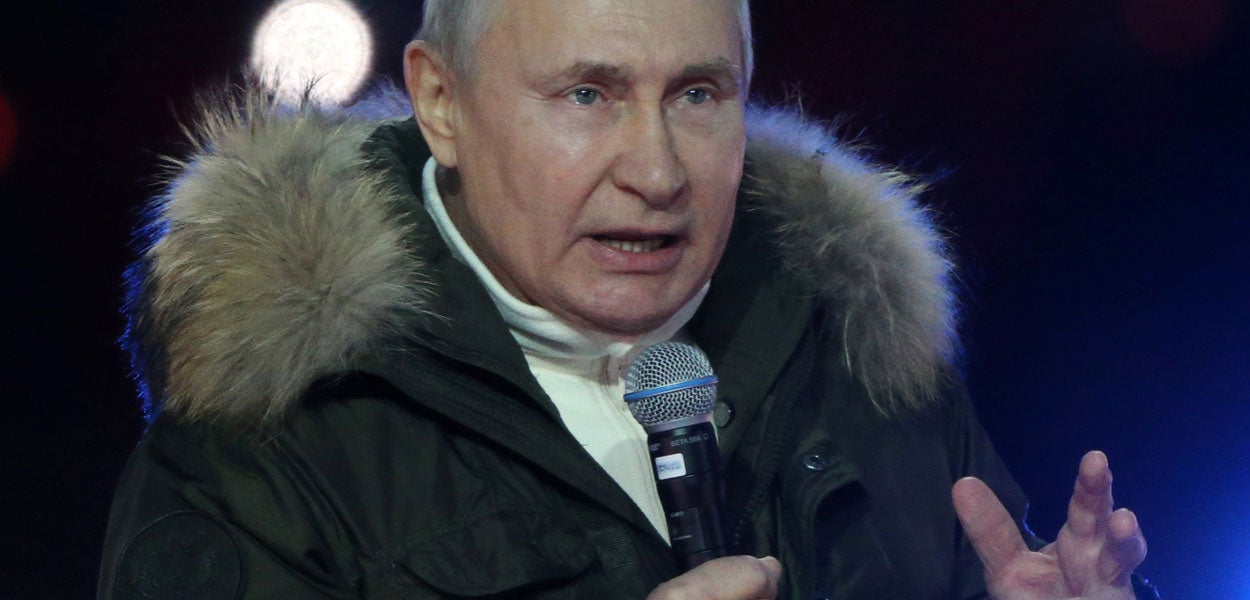President Joe Biden indisputably got the attention of his Russian counterpart, Vladimir Putin. It turns out Putin is a little thin-skinned about being called a soulless killer. Who would have known?
In an interview with ABC’s George Stephanopoulos, Biden recounted one of his many stories of bravura, this time during a meeting in Putin’s Kremlin office when Biden was vice president.
“I’m looking into your eyes, and I don’t think you have a soul,” Biden recalled saying.
The Daily Signal depends on the support of readers like you. Donate now
This was an apparent reference to a famous statement by President George W. Bush after he met Putin. Bush had said he looked into the Russian president’s eyes and was “able to get a sense of his soul.”
Biden, retelling his own encounter with Putin, said: “He looked back at me and said, ‘We understand each other.’”
Stephanopoulos asked: “So you know Vladimir Putin; you think he’s a killer?”
The American president responded without hesitation: “Uh-huh, I do.”
The Kremlin’s reaction was swift and full of indignation. Putin characteristically lost no time in challenging Biden to a live debate, a rhetorical fistfight.
Biden got this one exactly right.
Bush had looked into Putin’s eyes and thought he found understanding. President Barack Obama sent Secretary of State Hillary Clinton to Russia with a feeble and incorrectly translated “reset button.” President Donald Trump wanted to find common ground with the Russian government, even though his record was far tougher than his predecessors’.
But you just can’t deal with a killer.
Scorched Earth
Putin is a killer because his meteoric rise to power was based on one of the most brutal and bloody military actions in history, the siege of the Chechen capital of Grozny during the Second Chechen War in 1999.
After the military humiliation of then-Russian President Boris Yeltsin’s regime by Chechen separatists during the First Chechen War, Putin took charge of the war when he became Russia’s prime minister in the summer of 1999.
Putin aimed his scorched-earth strategy in Chechnya at squashing the insurrection that sprung up during the days of the Soviet Union’s dissolution. Between late 1999 and early 2000, overwhelming Russian forces laid siege to Grozny, Chechnya’s capital.
As Putin turned his weapons on civilian targets, 300,000 of Grozny’s 800,000 civilians fled the city. Between 50,000 and 80,000, most civilians, were killed. Russian tanks flattened the city.
Grozny was likened to the ruins of Dresden and Hiroshima; the United Nations described it as “the most destroyed city on earth.”
After rising from head of Russia’s Federal Security Service, the FSB, to prime minister in 1999, Putin succeeded Yeltsin as president on New Year’s Eve. He has ruled ruthlessly ever since. Putin’s rise to power was premised on restoring Russian greatness, and he would stop at nothing to make that happen.
Meddling in Syria
Putin is also a killer because of his military and political support for Syria’s brutal dictator, Bashar Assad.
In 2011, the Kremlin renewed its alliance with the Assad regime, taking advantage of the power vacuum created by Obama’s reluctance to be entangled in Syria. The result was the use of the lethal nerve gas sarin in 2013 against hundreds of Syrians, including children, and also during the years of war that followed.
In 2015, Russia became militarily involved in Syria in the first conflict beyond its borders since the fall of the Soviet Union in 1991. The Russian air force targeted hospitals and medical facilities, especially in Syria’s northwestern areas.
According to a 2020 report, the World Health Organization has documented more than 500 airstrikes on medical facilities “since it began counting them in 2016.” The attacks have continued, including a Russian assault on a hospital March 22 that provoked international condemnation.
The brutality of the civil war in Syria fueled the flames that resulted in the rise of the Islamic State, the terrorist army also known as ISIS, in Syria, Iraq, and beyond.
Putin’s aim, again, is to preserve and extend Russian influence and become the future power broker in the Middle East, especially if the Biden administration shows no sign of wanting to extend U.S. engagement in Syria.
Aggression in Ukraine, Georgia
Putin is also a killer because of the continuing Russo-Ukrainian War in the eastern Donbas region of Ukraine, which began more than seven years ago.
The war, which involves Russian-backed separatist forces and Ukrainian troops, has resulted in approximately 14,000 combat-related deaths. Russia is the one to blame for starting the war, and Russian aggression is the reason for its continuation.
In Ukraine, Russia is also responsible for annexing Crimea, persecuting the Crimean Tatars, and downing Malaysia Airlines Flight 17, killing all 298 aboard in 2014.
The former Soviet republic of Georgia also has been affected by Putin’s “killer” mindset. Russia is to blame for the continued “borderization” of Georgia’s territory and, in the same vein, the deaths of innocent Georgians.
Russian-led forces, by erecting fences and barriers along the edge of the Tskhinvali (South Ossetia) region, have separated Georgian communities and prevented the population from crossing the border, sometimes even at the cost of their lives.
Former Virginia Gov. Jim Gilmore, then ambassador to the Organization for Security and Cooperation in Europe, revealed in April 2020 that “a number of people have needlessly died because the Russian-led de facto South Ossetian authorities did not allow those Georgian citizens to cross the administrative boundary line to seek medical help.”
Putin is a killer for allowing this to happen in neighboring Georgia.
Silencing Critics
Putin also is a killer because of the Russian state’s violence against protesters. In July 2019, for example, when Russian protesters demanded that dissidents be allowed to run in local city council elections, police beat several opposition candidates and numerous protesters.
And in January, when citizens protested the arrest of opposition leader Alexei Navalny, riot police violently charged the crowds. Putin appears to have no issue with meeting protests with violence.
But Putin isn’t just a killer in the physical sense regarding such protests; he is also a killer in the sense that he kills practically any chance of a true democracy in Russia as long as he remains in power. And he kills the hope of a better future for Russian citizens for the foreseeable future.
Putin also is a killer for actually killing, or attempting to kill, some of his critics. In 2006, two Russian FSB agents assassinated a Putin critic, Alexander Litvinenko, by lacing his tea with the radioactive metal polonium. In 2015, several Chechens assassinated Putin critic and opposition leader Boris Nemtsov by gunshot on the prominent bridge off Red Square.
In 2018, two agents with the Main Intelligence Directorate, or GRU, attempted to assassinate former double agent Sergei Skripal and his daughter Yulia with a military-grade nerve agent known as Novichok. The two agents managed to kill an innocent bystander with the nerve agent.
In 2019, agents of the Russian or Chechen government publicly assassinated a Georgian man in Berlin for being a Chechen separatist. Last year, a team of FSB agents also attempted to assassinate Navalny with Novichok.
Over the years, Russia has poisoned multiple others for what it deemed disloyalty to the state. It is likely that Putin was behind all these assassinations and assassination attempts.
Lastly, the fact that the GRU offered bounties to Taliban-linked militants for targeting and killing American troops in Afghanistan also proves that Putin is a killer.
Biden is right in calling Putin a killer. As one can tell from the examples above, the Russian president’s numerous murderous transgressions more than qualify him as such.
It is essential to remember that the U.S. cannot trust Russia as a partner so long as Vladimir Putin is in power. He is beyond the point at which he can be trusted.
Have an opinion about this article? To sound off, please email letters@DailySignal.com and we will consider publishing your remarks in our regular “We Hear You” feature.































